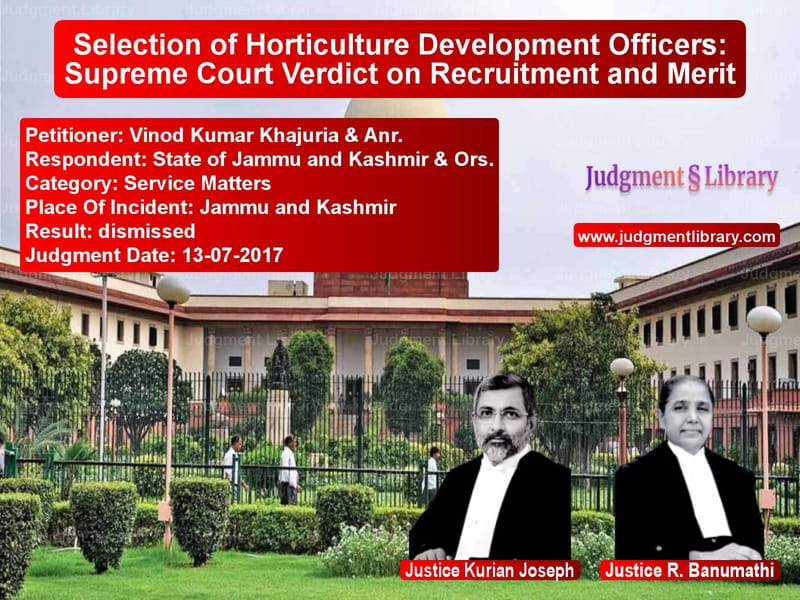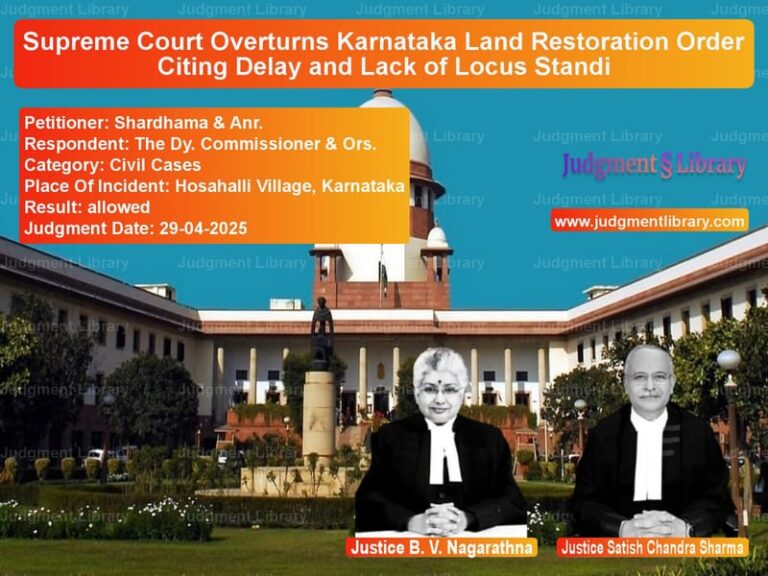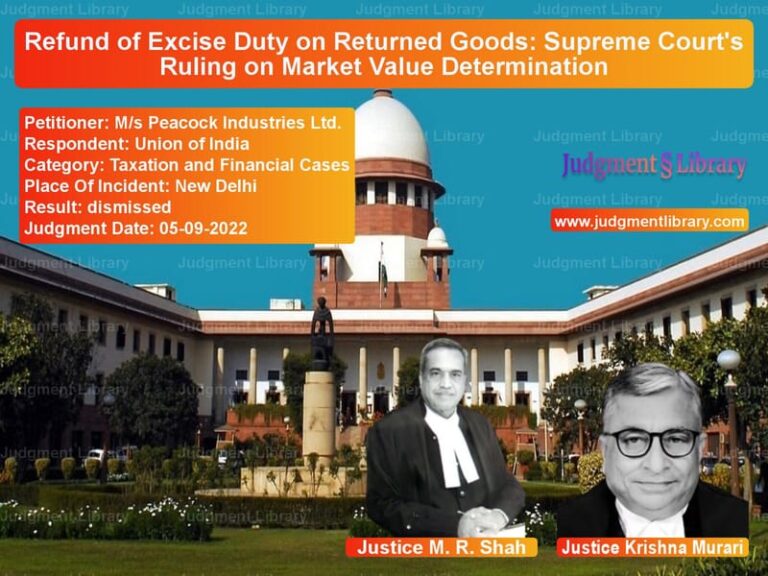Selection of Horticulture Development Officers: Supreme Court Verdict on Recruitment and Merit
The case of Vinod Kumar Khajuria & Anr. vs. State of Jammu and Kashmir & Ors. deals with the recruitment of Horticulture Development Officers (HDOs) in the Agricultural Production and Rural Development Department of Jammu and Kashmir. The case highlights the judicial scrutiny of the selection process, merit considerations, and the Public Service Commission’s role in recruitment.
The Supreme Court was called upon to decide whether the selection process, conducted after a prolonged legal battle, adhered to the principles of fairness and merit-based selection.
Background of the Case
The recruitment process for Horticulture Development Officers (HDOs) began with a notification issued in 1997. However, litigation delayed the appointments, leading to legal battles that culminated in the High Court’s intervention. Eventually, the candidates were appointed in 2006, following the High Court’s directive.
Despite the appointments, some petitioners challenged the process, alleging irregularities and favoritism in the selection. The case was brought before the Supreme Court to examine whether the Public Service Commission’s selection had compromised merit.
Petitioners’ Arguments
The petitioners, represented by their legal counsel, made the following submissions:
- The selection process suffered from procedural irregularities and favoritism.
- Several eligible candidates were overlooked without valid reasons.
- The selection was influenced by extraneous considerations rather than being strictly merit-based.
- The appointments should be reviewed, and a fresh selection process should be conducted to ensure fairness.
Respondents’ Arguments
The State of Jammu and Kashmir and the Public Service Commission defended the selection process, arguing:
- The recruitment was conducted in a fair and transparent manner.
- All candidates had participated in the screening test, and selections were based on merit.
- The High Court had already examined the allegations and found no basis for interfering with the appointments.
- Setting aside the selection would disrupt the administration and create unnecessary uncertainty for those already appointed.
Supreme Court’s Observations and Judgment
The Supreme Court, in a judgment delivered by Justice Kurian Joseph, upheld the High Court’s ruling and dismissed the appeals. The key observations made by the Court were:
- “Having gone through the order passed by the High Court, we do not find it difficult to take a different view.”
- All the writ petitioners had participated in the screening test, and there was no evidence to suggest that the selection process was unfair.
- “The Public Service Commission has not compromised the merit while making the selection.”
- The selection had already been implemented, and disturbing it at this stage would not serve any purpose.
The Supreme Court concluded that there was no merit in the appeals and dismissed them. It also ruled that there would be no orders as to costs.
Key Legal Takeaways
This ruling establishes several important legal principles regarding recruitment processes:
- Judicial Deference to Selection Bodies: Courts will not interfere in recruitment processes unless clear evidence of bias or irregularities is presented.
- Merit-Based Selection is Paramount: The selection of candidates through a fair and transparent screening test must be upheld to maintain the integrity of public recruitment.
- Finality of High Court Decisions: Once the High Court has scrutinized and upheld a selection process, the Supreme Court is unlikely to intervene without compelling reasons.
Impact of the Judgment
The Supreme Court’s ruling has significant implications for public service recruitments:
- It reinforces the importance of conducting fair and merit-based recruitment.
- It discourages unnecessary litigation that could delay appointments and disrupt administrative efficiency.
- It provides clarity on the legal standards required to challenge recruitment processes.
Conclusion
The Supreme Court’s decision in Vinod Kumar Khajuria & Anr. vs. State of Jammu and Kashmir & Ors. upholds the principle that courts should not interfere with a duly conducted recruitment process unless there is substantial proof of irregularities. The ruling ensures that merit-based selection remains the guiding principle for public employment while discouraging frivolous legal challenges that could stall government functioning.
This judgment serves as a significant precedent for future cases involving disputes over recruitment and selection processes.
Don’t miss out on the full details! Download the complete judgment in PDF format below and gain valuable insights instantly!
Download Judgment: Vinod Kumar Khajuria vs State of Jammu and K Supreme Court of India Judgment Dated 13-07-2017.pdf
Direct Downlaod Judgment: Direct downlaod this Judgment
See all petitions in Recruitment Policies
See all petitions in Public Sector Employees
See all petitions in Employment Disputes
See all petitions in Judgment by Kurian Joseph
See all petitions in Judgment by R. Banumathi
See all petitions in dismissed
See all petitions in supreme court of India judgments July 2017
See all petitions in 2017 judgments
See all posts in Service Matters Category
See all allowed petitions in Service Matters Category
See all Dismissed petitions in Service Matters Category
See all partially allowed petitions in Service Matters Category







